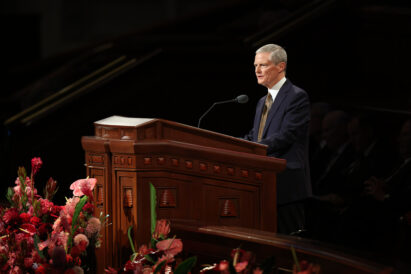COMER: President Oaks’ 1971 counsel on gambling as relevant as ever
- A digital advertisement for the online gambling company FanDuel is displayed in the first half of an NBA basketball game between the Miami Heat and the Memphis Grizzlies on Friday, Oct. 24, 2025, in Memphis, Tenn.
- Ryan Comer

Brandon Dill, Associated Press
A digital advertisement for the online gambling company FanDuel is displayed in the first half of an NBA basketball game between the Miami Heat and the Memphis Grizzlies on Friday, Oct. 24, 2025, in Memphis, Tenn.
I was listening to a sports talk show this week and the discussion was on the recent gambling scandal involving the NBA.
“Is gambling ruining sports?” one of the hosts of the show asked the other.
It’s an interesting topic at an interesting time. Last month, Dallin H. Oaks was sustained as the 18th president of The Church of Jesus Christ of Latter-day Saints.
Nearly 55 years ago, in September 1971, President Oaks delivered his first address as president of Brigham Young University. The topic: gambling.
To listen to the talk now feels surreal. One can scarcely imagine what President Oaks, or anyone for that matter, would have thought then if they saw the unprecedented proliferation of gambling today.

Ryan Comer, Standard-Examiner
Ryan Comer
According to an article by Sports Business Journal dated Oct. 24, “The NBA has multiple business arrangements with major betting brands such as DraftKings, FanDuel and BetMGM, and several of its teams host sportsbooks in their arenas, in which they are paid a percentage of the handle, which is the amount of money wagered.”
It continued: “Under league Commissioner Adam Silver, the NBA (in conjunction with the other pro leagues) has ‘sought a federal sports betting law from Congress, but many lobbying efforts have not gained traction’ (The Athletic, 10/24)”
Sports gambling is so ubiquitous that tickers appear regularly on the bottom of the screen on prominent sports networks. Many chuckled as news of the recent NBA scandal broke on one of ESPN’s morning shows because as the report was being given, an ESPN Bet advertisement was shown on the bottom of the screen, and then suddenly (seemingly intentionally) it disappeared.
President Oaks’ comments may be over a half-century old, but they are highly relevant, and we can easily see the negative fruits of the widespread acceptance of gambling of which he warned.
Introduction
“My topic is simply a subject of current importance, which so far as I have been able to determine has not been the subject of a devotional address on the Brigham Young University campus for many years,” President Oaks said as he introduced his topic.
President Oaks proceeded to explain three news stories that underscored the importance of the subject: 1) A law being signed in Illinois to legalize bingo in the state “when it was operated by charitable, religious or fraternal organizations,” 2) Nine off-track betting sites opening in New York City as a result of its “newly organized and legalized off-track betting corporation” and 3) Multiple states establishing or “moving toward establishing state lotteries as a source of revenue.”
Explaining the increasing popularity of gambling, President Oaks highlighted “increases in the amount of free time and increases in the amount of extra cash on the hands of our fellow Americans.” For the government’s part, President Oaks said, “tax revenue to finance the increasingly expensive and widespread activities of state and local government” was a motivation.
To explain the position of The Church of Jesus Christ of Latter-day Saints on gambling, President Oaks read the statement by the First Presidency of the church in September 1925 that said:
“The church has been and now is unalterably opposed to gambling in any form whatever. It is opposed to any game of chance, occupation or so-called business which takes money from a person who may be possessed of it without giving value in return. It is opposed to all practices the tendency of which is to encourage the spirit of reckless speculation and particularly to that which tends to degrade or weaken the high moral standard which the members of the church and our community at large have always maintained. We therefore advise and urge all members of the church to refrain from participation in any activity which is contrary to the view herein expressed.”
Upholding that statement 46 years later, President Oaks said:
“Subsequent statements by leaders of the church have elaborated on the reasons for this strong position, but it has never been qualified.”
The history of gambling
President Oaks went on to discuss the history of gambling and its evils.
“In ancient Egypt, persons convicted of gambling were sent to the quarries,” he said. “Gambling was denounced in the Hindu code, the Quran and the Talmudic law. Aristotle denounced gamblers as thieves and plunderers.
“Gambling spread in the middle-ages, especially among the nobility, but even those who practiced games of chance were willing to recognize their evil, at least for others.
“Legislation in England and France attempted to counteract the detrimental effects of gambling on servants, observing that it induced them to idleness or caused them to neglect archery practice, thus endangering national security.”
Fast forward to the early days of the United States, and the popularity of lotteries was surging.
“Lotteries were so widespread in the United States in the early 1800s that there were almost 200 lottery offices in the state of New York alone,” President Oaks said. “In 1832, the gross sale of lottery tickets was over $60 million, which was five times the total national budget of the United States government.
“It has been suggested that lotteries were a popular way to finance large projects because there were few reliable banks during this period and therefore no regular means to obtain a huge sum by aggregating a large number of small amounts from citizens of limited means.”
Opposition to gambling
Nevertheless, public opposition to lotteries was growing, President Oaks explained, and it is in his explanation of why this opposition was growing that we see clearly the evil.
“The development opposing lotteries came first in England in 1773 when the city of London petitioned the House of Commons to abolish lotteries as highly injurious to the commerce of the kingdom and to the welfare and prosperity of the people,” President Oaks said. “In 1808, the Commons appointed a select committee to inquire into the evils attending lotteries.
“The committee report, which was an important factor in the abolition of lotteries in England a few years later, is so current that it could just as well have been written last week instead of over 160 years ago. The committee reported cases where people living in comfort and respectability had been reduced to poverty and distress. Cases of domestic quarrels, assaults and the ruin of family peace, fathers deserting their families, mothers neglecting their children, wives robbing their husbands of the earnings of months and years and the pawning of clothing, beds and wedding rings in order to indulge in the speculation.
“In other cases, the committee reported, children had robbed their parents, servants their masters, suicides had been committed and almost every crime that can be imagined had been occasioned either directly or indirectly through the baneful influence of lotteries.
“In its final report, the committee concluded that the foundation of the lottery system was so radically vicious that no system of regulation could be devised that would permit Parliament to adopt it as an efficacious source of revenue and at the same time divest it of all of its intendent evils.”
Gambling as big business
In the United States at the time President Oaks delivered this talk, he said “illegal gambling is bigger than big business” and pointed out that “the estimated total annual profits from illegal gambling are … six to seven billion dollars per year,” which he said was “50% more than the combined 1970 profits of American Telephone and Telegraph, General Motors, IBM and Standard Oil of New Jersey.”
He quoted Robert F. Kennedy, attorney general in 1962, as saying Americans were “spending more on gambling than on medical care or education; that, in doing so, they are putting up the money for the corruption of public officials and the vicious activities of the dope peddlers, loan sharks, bootleggers, white-slave traders and slick confidence men. Investigations this past year by the FBI, the Internal Revenue Service… the Post Office Department and all other federal investigative units has disclosed without any shadow of a doubt that corruption and racketeering, financed largely by gambling, are weakening the vitality and strength of this nation.”
Justifying gambling
Explaining the justifications given for proposals to legalize gambling, President Oaks highlighted “significant revenues to state treasuries,” weakening of “organized crime by drawing up some of its principle sources of financial support,” reduction of “graft and illegal payoffs to public officials” and the inability to enforce gambling laws.
“Closely examined, none of these arguments is persuasive,” he declared.
The argument against legalized gambling
President Oaks elaborated:
“When the late Thomas E. Dewey was governor of New York state, he answered them in the following words. ‘The entire history of legalized gambling in this country and abroad shows that it has brought nothing but poverty, crime and corruption, demoralization of moral and ethical standards and ultimately lower living standards and misery for all of the people.’
“In urging the new state of Alaska not to legalize gambling as an economic panacea, Senator Alexander Wiley of Wisconsin gave some additional financial reasons.
“‘The idea that gambling would increase net revenues was an illusion. Every dollar raised from gambling would mean five dollars spent in higher police costs, higher court costs, higher penitentiary costs and higher relief costs.’
“In addition to all of these reasons, gambling should not be legalized because it is immoral. Of course, the law is too imperfect an instrument to condemn all immoral conduct. Thus, it is immoral to hate, but the law cannot efficiently condemn that sin. But gambling is different. Its evil effects can fairly be measured in the lives of those who are affected by it.
“Few would urge that the law should promote gambling, yet to legalize gambling would have just that result. The law has an important standard-setting function. A law legalizing gambling would, in the eyes of many, be a formal declaration that this kind of conduct is moral, proper and expected.
“Persons now deterred from participating in gambling because they believe it to be illegal and immoral would be encouraged to participate if it were legalized.
“Gambling is especially pernicious when it is administered by government or where government relies on it for a substantial source of tax revenues. In times when our government’s appetites for taxes seem insatiable, government officials who depended on gambling for a share of the public budget would have a strong temptation to promote gambling and to protect it against opposition.
“Those who doubt the force of this argument should consider the history of efforts to impose more stringent government controls on the deadly tobacco product. These efforts are commonly and forcefully resisted on the grounds that the needed health measures would reduce the essential tax revenues and disrupt the economies of certain states and throw many out of work.
“Let us not allow the monster gambling to obtain that same hold on our governments and our lawful businesses. Government should work to refine the moral sensitivities of its citizens, not pander to their weaknesses. As one law enforcement official stated, ‘any society that bases its financial structure on the weaknesses of its people doesn’t deserve to survive.'”
Five reasons the church opposes gambling
President Oaks proceeded to give five reasons church leaders have counseled “to avoid gambling and to fight this evil practice in our communities.”
First, President Oaks said, principles foundational to national prosperity, like work ethic, industry, thrift and service, are weakened because gambling promotes the idea of something for nothing. He also said gambling encourages idleness and everything bad for society that results.
“President Stephen L. Richards, in an impressive address delivered at an MIA June conference, reminded his listeners how ‘the basis of all legitimate business is a fair exchange of values. Honest work for honest pay. Goods of value for other goods of value. Gambling, on the other hand, proceeds upon the assumption that one has to lose for another to gain, which is a wholly erroneous foundation,'” President Oaks said.
“President Richards went on to describe how the element of chance in gambling leads those who indulge in it to believe that chance is the controlling and dominant influence in life. ‘And so obsessed do some people become with it,’ he said, ‘that they cannot contemplate or think of any other way in which to increase their means and their income except by taking the chance that gambling affords.’
“I need not remind this audience of the importance of the ethic of work to the gospel of Jesus Christ. The scriptures condemn idleness and call the idler to repentance. As President J. Reuben Clark reminded the church in a great address in 1937, ‘we must purge our hearts of the love of ease. We must put out from our lives the curse of idleness. God declared that mortal man should earn his bread by the sweat of his brow. That is the law of this world.’
“President Joseph F. Smith gave expression to the same thought when he said, ‘We do not feel it is possible for men to be really good and faithful Christian people unless they can also be good, faithful, honest and industrious people. Therefore, we preach the gospel of economy, the gospel of sobriety. We preach that the idler shall not eat the bread of the laborer, and that the idler is not entitled to an inheritance in Zion.’
“That spirit, that philosophy which is basic to our approach to life, stands in eternal condemnation of gambling.”
Second, President Oaks said, is the promotion of greed and covetousness and the inevitability of encouraging taking from someone else.
“Can a Christian honestly use his gifts in gambling when his winnings are gained at the expense of another’s losing, a Methodist minister asked,” he said. “This minister, Lycurgus M. Starkey Jr. of the Saint Paul School of Theology in Kansas City, concluded with an attack on gambling with a conclusion with which every Latter-day Saint can identify.
“‘The good Christian’s love of neighbor will stand against every practice which hinders the growth of the human spirit toward the likeness of Christ or which breaks down the structures of justice in society. The Christian will himself refrain from gambling and from publicly endorsing it in any form, realizing that gambling is detrimental to the purpose of life as revealed in Jesus Christ.'”
Third, President Oaks said, is gambling’s tendency to corrupt the participant.
“We are all familiar with cases where trusted employees have ruined their lives and brought tragedy and disgrace upon themselves and their families by stealing their employers’ money,” he said. “All too often, the sorted story is traceable to a desperate attempt to pay gambling debts or to finance further gambling activities.
“The temptations to which the gambler is subjected are such that persons in responsible positions in government and private industry will not hire or retain in employment those who are known to gamble.
“In recounting the undesirable side effects of gambling, mention must also be made of the fact that gambling is also often accompanied by indulgence in alcohol and other vices.”
Fourth, President Oaks discussed the amount of time wasted by gambling.
He said:
“Writing about 200 years ago, John Locke urged his readers to avoid what he called ‘this encroaching waster of useful time.’
“‘Tis certain,’ he said, ‘gaming leaves no satisfaction behind it to those who reflect when it is over, and it in no way profits either body or mind,’
“Those who wile away their hours in gambling frequently do so to the neglect of family and work. The waste of time involved in gambling is all the more significant when we reflect that many persons who indulge in gambling become addicted to it.
“President Joseph Fielding Smith has declared that ‘gambling is a disease which fastens itself upon those who indulge so tenaciously that they seldom quit.’
“Elder Richard L. Evans has described how ‘the spirit of gambling is a progressive thing. Usually, it begins modestly, and then, like many other hazardous habits, it often grows beyond control. At best, it wastes time and produces nothing. At worst, it becomes a ruinous obsession and fosters a false living by encouraging the futile belief that we can continually get something for nothing.'”
The final reason, according to President Oaks, is how “the finer sensitivities of the soul” are destroyed.
He said:
“Elder John A. Widtsoe of the Council of the Twelve gave vivid expression to this thought in the following words: ‘They who gamble, who walk with chance, suffer degeneration of character. They become spiritually flabby. They end as enemies of a wholesome society. A gambling den, however beautifully housed, is the ugliest place on earth. The tense participants live in a silence broken only over the tables by the swish of the wings of darkness. There is an ever-present brooding spirit of horror of an unknown evil. It is the devil’s own home.’
“Whenever a Latter-day Saint engages in any kind of conduct that is inconsistent with the companionship of the Spirit of the Lord, he or she pays an enormous price. Left without the sustaining influence of that spirit, we are vulnerable to temptation, prone to criticism and subject to being tossed to and fro and buffeted by the forces of the world and the works of the evil one. There can be no question but that gambling dulls the spiritual sensitivities of those who participate in it. In that terrible effect, we may identify gambling’s most far-reaching and evil influence.”
What constitutes gambling?
According to President Oaks, activities that could be included under the umbrella of gambling include “playing cards for money, betting on horses and athletic contests, including the office pools on the World Series, casino gambling in all of its forms, lotteries, raffles, bingo for money, dice games and so on.”
He added:
“I submit that the spirit of gambling, the same reckless wagering on the chance turn of events, characterizes some forms of investment. The same evils that attend a throw of the dice for money can attend the person who casually puts his money on a highly speculative stock or commodity investment.
“I know of no better test in this area than that suggested by President Joseph F. Smith, who said as follows: ‘The element of chance enters very largely into everything we undertake. And it should be remembered that the spirit in which we do things decides very largely whether we are gambling or are entering into legitimate business enterprises.'”
Conclusion
President Oaks continued by warning against card-playing in general before concluding his remarks with a reemphasis on his five stated points.
“Gambling is a moral evil,” he said, “that we should avoid for the five reasons I have related … Those should be sufficient reasons to cause any Latter-day Saint to resolve to abstain from gambling in all of its forms. But today in America, with increasingly common and persuasive proposals to legalize gambling, we need a broader resolve.
“I urge each of you to use your influence as citizens to combat all attempts to use the evil of gambling as a means of accomplishing some supposed social good, including particularly the raising of revenue.
“When the First Presidency of our church opposed parimutuel betting in Utah in 1925, they gave the proper response to legalized gambling in all of its forms. I repeat their words. ‘The Church has been and now is unalterably opposed to gambling in any form whatever. We therefore advise and urge all members of the church to refrain from participating in any activity which is contrary to the view herein set forth.'”
Contact Ryan Comer at rcomer@standard.net.




